When running a B2B commerce service, choosing the right platform can make a world of difference. It can help you stay ahead of your competitors and drive your business’s success.
There are many options available in the market, which makes the task of choosing the right one even more difficult. To help you out, we have created a comprehensive guide to finding the right B2B ecommerce platform for your business.
So keep reading as we look deeper into how to choose a B2B ecommerce platform for your business.
What is a B2B Ecommerce Platform?
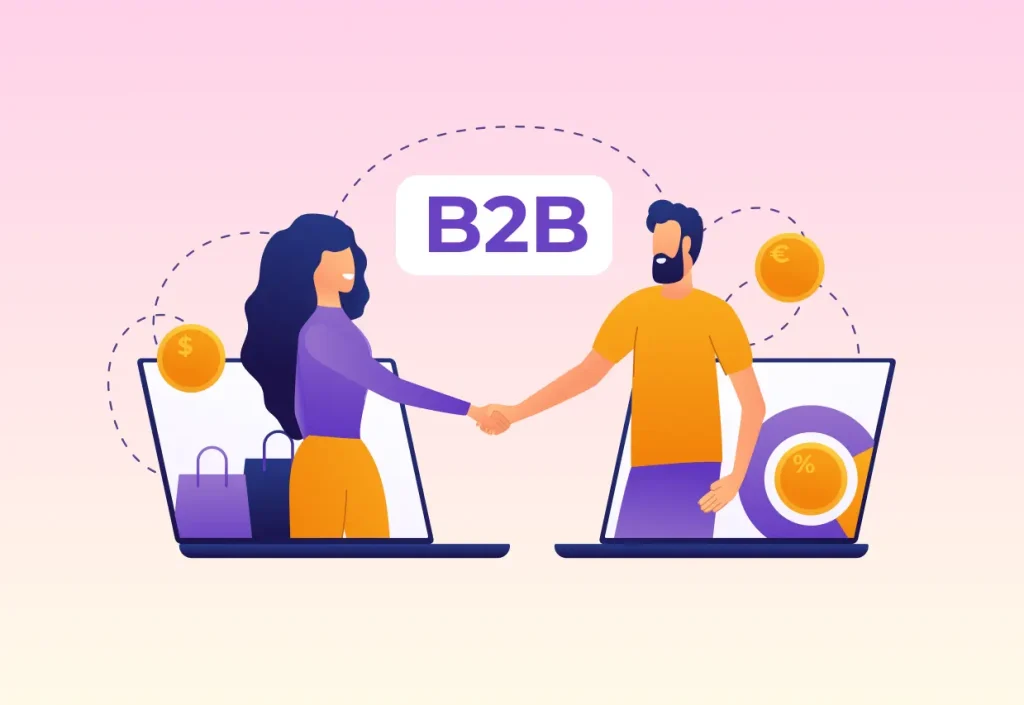
B2B ecommerce platforms are online tools (websites with large-scale ecommerce capability) that enable businesses to buy and sell to other businesses. They handle bulk orders, custom pricing, and streamline operations, supporting transactions that help businesses supply goods and services to the B2C market.
The B2B ecommerce market holds a significant share of global ecommerce. According to a recent report, the global B2B ecommerce market is valued at over $7 trillion and is projected to reach $36 trillion by 2031.
A few examples of B2B ecommerce across various sectors include –
Industrial and Manufacturing
- Raw Materials, Small to Large scale machinery and accessories.
- Who Sells to Whom: Manufacturers and distributors to factories, construction companies, etc.
IT and Technology
- Electric machinery hardware, ERP, servers, CRM, SaaS software, etc.
- Who Sells to Whom: IT manufacturers and SaaS companies to businesses of all sizes.
Wholesale Products
- Retail Goods, Food and Beverages, Household Supplies
- Who Sells to Whom: Wholesalers to retailers, grocery chains, and resellers.
How to Choose a B2B Ecommerce Platform | Step-by-Step Guide
With so many B2B platforms out there, finding the one that guarantees ease and success can be a challenge. Let’s look at what you need to consider to find the best B2B ecommerce platform for your business.
1. Define Your Business Needs
B2B operations are typically large-scale compared to B2C, so it’s crucial to clearly define your business needs before entering the market. Consider factors such as your business size, target audience, geographical reach, and the complexity of ordering, dispatching, and delivery processes.
Also, identify the specific features and functionalities required to support your operations effectively to draft a clear outline of your business size, operational intensity, and feature requirements.
2. Explore Offered Features
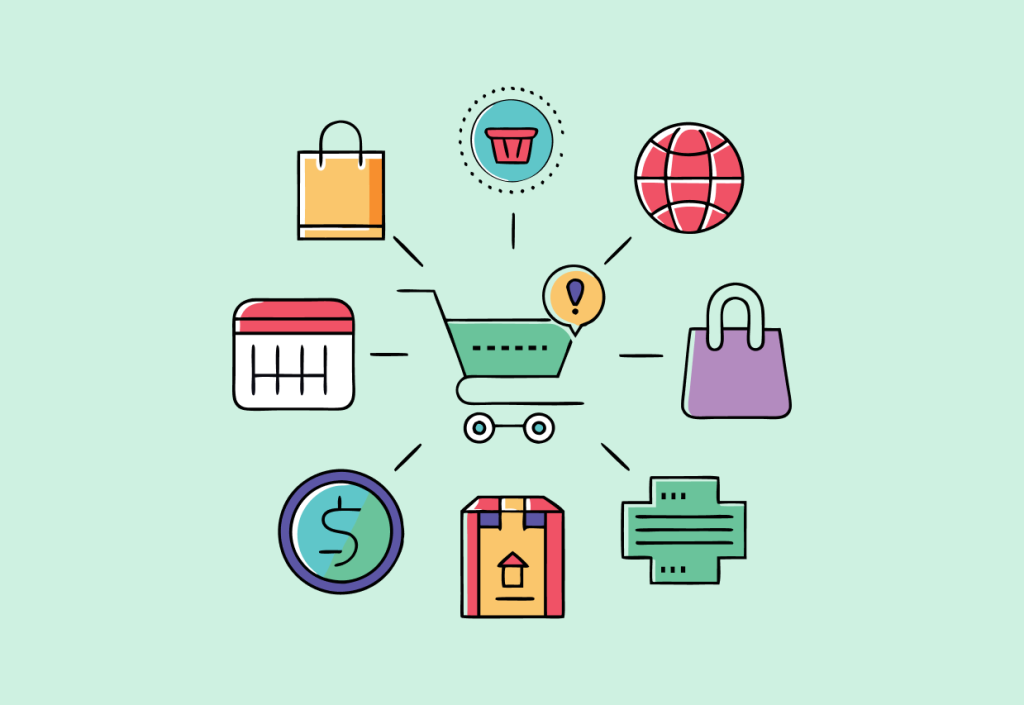
The next step is to explore the leading B2B ecommerce platforms and assess which features they’re offering.
With your business needs already defined, matching the right features will be much easier. While there are no strict limits on the features you can expect, the platform should ideally include essential B2B capabilities, such as –
- Bulk Ordering & Custom Pricing: Support for large orders and tiered pricing.
- Flexible Payment Options: Multiple payment methods, including credit terms and invoicing.
- Third-Party Integration: Scope to integrate out-of-the-box essentials such as CRM, ERP, ticketing, etc.
- Order Management System: Tracks and manages orders, history, and status updates.
- Shipping and Logistics Management: Manages shipping, freight, and delivery options.
- Security and Compliance: Ensures data protection with strong security features and compliance standards.
Also, features like international transactions, multi-currency, multi-language support, and tax compliance are essential for managing cross-border business operations.
3. Analyze Costing Factors
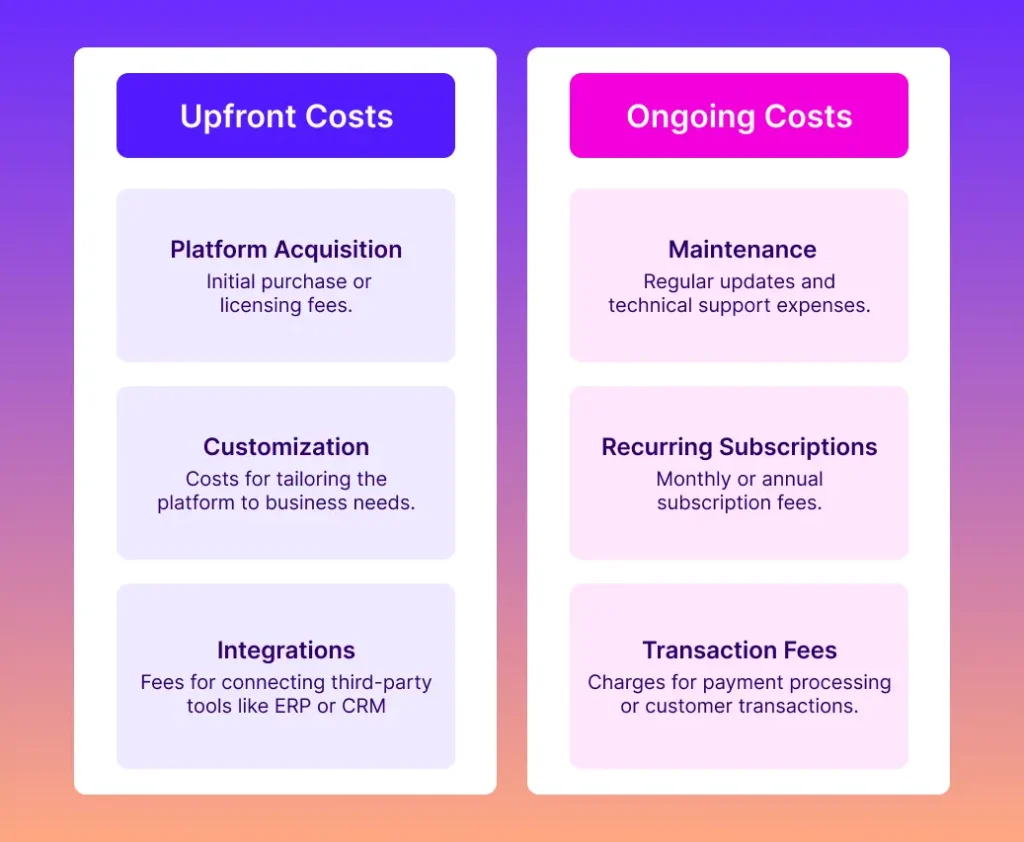
B2B platform costs can vary significantly based on the features you need. It’s important to consider both upfront expenses, such as subscription fees and setup costs, and ongoing costs, including transaction fees, maintenance, and integrations. Customization expenses should also be factored in to ensure the platform aligns with your business requirements.
While these costs are a natural part of running a business and represent only a fraction of the revenue exchanged, simpler and more cost-effective solutions are always preferable.
Possible cost factors involved in B2B ecommerce platform include –
Upfront Costs
- Platform Acquisition: Initial purchase or licensing fees.
- Customization: Costs for tailoring the platform to business needs.
- Integrations: Fees for connecting third-party tools like ERP or CRM.
Ongoing Costs
- Maintenance: Regular updates and technical support expenses.
- Recurring Subscriptions: Monthly or annual subscription fees.
- Transaction Fees: Charges for payment processing or customer transactions.
4. Find Scalability and Customization Scope
B2B ecommerce involves managing vast product quantities, extensive variations, and high-volume transactions. Keep in mind that, your business is likely to outgrow its current size and demands as time goes by.
So, it’s better to choose a B2B ecommerce platform that is scalable to accommodate future growth or can efficiently handle high-intensity usage with its existing setup.
When it comes to customization, not all B2B ecommerce businesses operate the same way. Specific needs, such as adding unique features, white-labeling, integrating payment gateways, or connecting third-party software, are common requirements.
5. Setup and Complexity
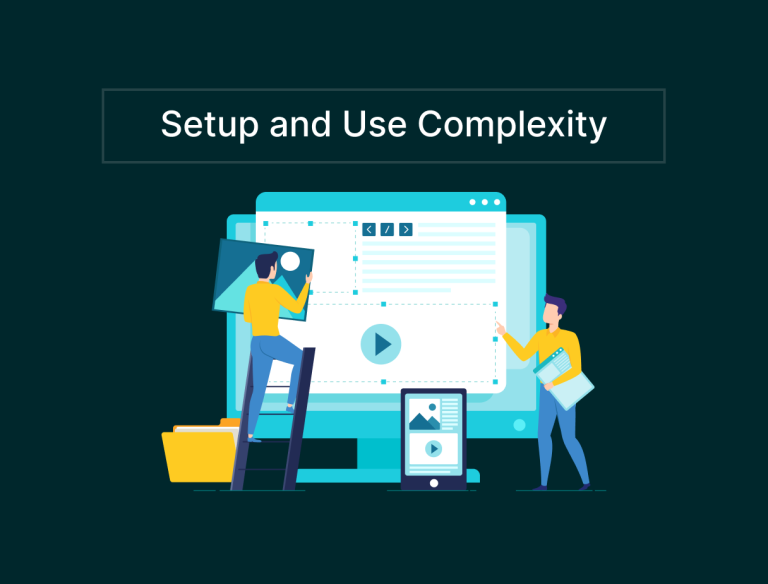
Setting up and customizing an ecommerce platform can give you a clear idea of its ease of use. Some B2B ecommerce platforms, like Shopify and Adobe Commerce, are hosted (SaaS), while others, like EasyCommerce, are self-hosted. Each option has its own level of complexity and benefits.
- Hosted Platforms: These are plug-and-play solutions that come with built-in hosting and require minimal setup. They are user-friendly but often limit customization and personalized integrations, which may not suit all business needs.
- Self-Hosted Platforms: These require hosting to be managed by you or your technical team, along with manual integration and maintenance of components. While they demand more expertise, they are generally more cost-effective over time and offer greater flexibility for customizations to meet specific requirements.
Experts suggest that self-hosted platforms may be more complex to set up and maintain initially. However, they offer superior flexibility, scalability, customization options, and cost-effectiveness over time.
6. Review Security and Data Protection Policy
Security is crucial for any business, especially in B2B ecommerce. These platforms handle sensitive information like user details, product prices, bank accounts, transactions, and passwords. If the system is compromised, it can create massive risks for both the business and its customers.
That’s why it’s best to choose a platform with strong security features, like firewalls and encryption, to protect sensitive data. EasyCommerce focuses on safeguarding user data and privacy to provide a secure environment for both businesses and customers.
Avoid hosted platforms as they store all user data on their servers, risking total loss in case of a breach with no backup. Self-hosted solutions also give you more control over data and secure backups to offer better protection.
7. Test and Evaluate With Real Scenarios
Even after evaluating B2B ecommerce platforms for reliability, speed, and ease of use, the final step is to test and assess them in different scenarios. For example –
- High Traffic Load: Test how the platform performs during peak traffic times.
- Bulk Orders: Evaluate the platform’s ability to handle large quantities of products and orders.
- Payment Processing: Check for smoothness in handling different payment methods and currencies.
- Integration Testing: Ensure seamless integration with third-party tools like CRMs, ERPs, and shipping services.
- Customer Support: Test the platform’s customer service response times and effectiveness during issues.
These tests are essential because even the smallest mismatch in key areas can put your entire B2B ecommerce business in jeopardy. So, it’s better to be cautious upfront than to regret it later.
8. Choose The Ultimate B2B Ecommerce Platform

After evaluating the platform for the above factors, it’s time to choose the platform that best aligns with your business. Make sure the platform is a good fit in terms of features, cost, and scalability.
And don’t forget to look into customer reviews, vendor reputation, and support options before finalizing your decision.
If you’re looking for an established solution that meets all your needs and aligns with your business vision, we recommend EasyCommerce. Here’s why you can trust it –
- Business Needs: EasyCommerce supports businesses of all sizes with customizable features.
- Features Offered: Includes bulk ordering, custom pricing, flexible payments, and global transactions.
- Cost Analysis: Clear upfront costs with competitive pricing and cost-effective customization.
- Scalability & Customization: Easily scalable with flexibility for features, white-labeling, and integrations.
- Setup & Complexity: Self-hosted for full control, flexibility, and long-term cost savings.
- Security & Protection: Strong encryption, firewalls, and control over secure data backups.
- Testing & Evaluation: Handles high traffic, bulk orders, smooth payments, and seamless integrations.
When choosing the right ecommerce solution, it’s also Important to compare platforms like WordPress vs Shopify for Ecommerce and Magento vs WordPress for Ecommerce to determine which one best suits your business needs.
6 Factors to Consider When Choosing a B2B Ecommerce Platform
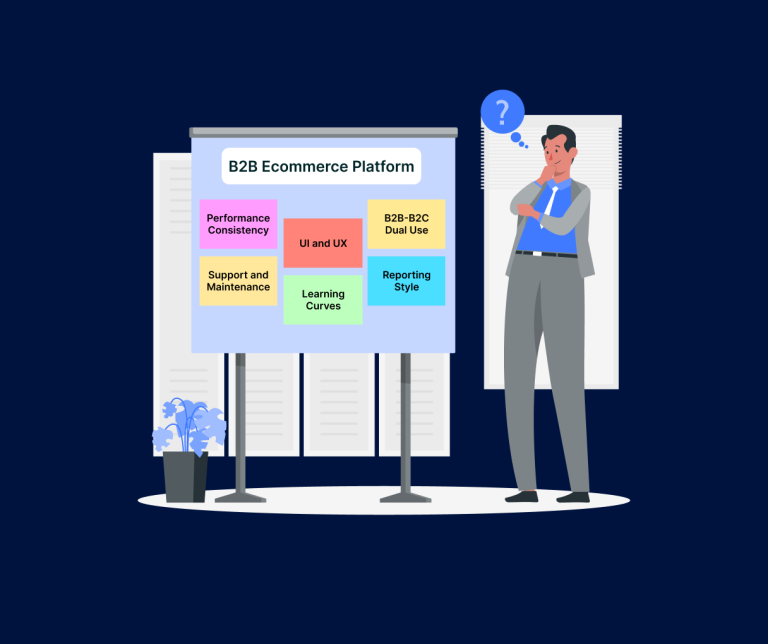
The steps outlined above on how to choose a B2B ecommerce platform are a must. But at the same time, some additional factors also need to be considered, which include –
- UI and UX: Due to most B2B ecommerce users not being tech-savvy, a clear interface and smooth user experience are essential in ensuring the platform is user-friendly and convenient.
- B2B and B2C Dual Use: Platforms like EasyCommerce support both B2B and B2C sales. If your business operates in both areas, consider one that handles bulk B2B orders and offers a user-friendly B2C shopping experience.
- Consistent Performance: Consistency is crucial when managing large quantities, numerous buyers, and high transaction volumes. So, choose a platform that guarantees reliable uptime to help you stay focused on your core business rather than worrying about slow performance or system failures.
- Support and Maintenance: A B2B ecommerce platform is a long-term investment, so it’s essential to ensure the chosen platform provides reliable support and ongoing maintenance for its users.
- Learning Curves: A steep learning curve can impact your business team’s efficiency. That’s why you should choose an ecommerce platform like EasyCommerce, which is easy to use and has a minimal learning curve.
- Reporting Style: Reporting and analytics are key in tracking sales and performance. Choose a platform with customizable reports that provide insights into metrics like revenue, customer lifetime value, and conversion rates to optimize your strategies.
Kickstart Your B2B Ecommerce With the Right Platform!
Choosing the right B2B ecommerce platform is like finding the right partner for your business. Just like any good partnership, the platform should offer qualities and commitment that align with your goals.
Start by understanding your business needs and evaluating the platform’s features, reliability, and ease of use. Next, focus on its customization options, scalability, and security measures to ensure long-term success.
Finally, make your selection based on the considerations that best suit your unique requirements. If you’d prefer a straightforward choice, EasyCommerce is a trusted B2B ecommerce platform that can meet your needs.
Frequently Asked Questions (FAQs)
How to start a B2B ecommerce business?
Starting a B2B ecommerce business involves strategic planning and the right tools. Here are some important steps you need to follow –
- Identify Your Niche: Choose a specific market or industry to focus on.
- Create a Business Plan: Outline goals, target audience, and revenue model.
- Choose a Platform: Select a reliable B2B ecommerce platform with essential features.
- Set Up Your Store: Add products, pricing, and payment options.
- Market Strategically: Use targeted ads, SEO, and email campaigns to attract clients.
What is the difference between B2B and B2C models?
B2B (Business-to-Business) focuses on transactions between businesses, emphasizing bulk orders, custom pricing, and building long-term relationships.
In contrast, B2C (Business-to-Consumer) caters to individual customers, prioritizing smaller purchases and standardized pricing. If you’re interested in learning more about how to choose a B2C ecommerce platform, we have covered this topic in detail.
Can you explain B2B ecommerce using an example of a book distributor?
B2B ecommerce for a book distributor involves selling books in bulk to retailers or schools online. For example –
A distributor might offer discounts, custom pricing, and easy ordering to a bookstore chain. This helps the bookstore quickly restock inventory while managing online bulk transactions and deliveries.

